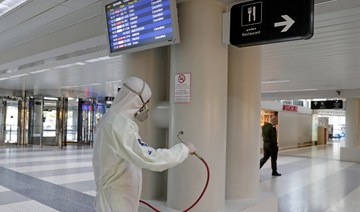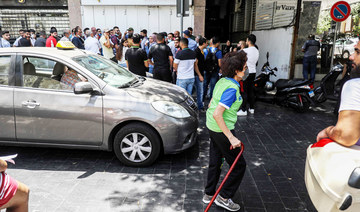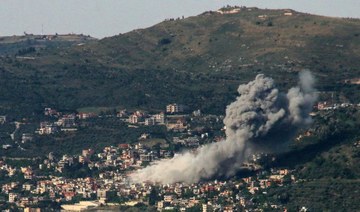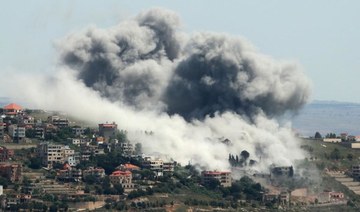BEIRUT: After preparing dozens of rice packages for out-of-work domestic staff, 30-year-old Tirsit breaks down in tears recounting life as a foreign housekeeper in crisis-hit Lebanon.
“The (recruitment) agencies sell us,” said the 30-year-old Ethiopian, a large sack heaped with bags of rice by her side.
“If I come to work for (a woman) and I don’t like it, or she hits me, or there is no food, if I want to change households or leave, I can’t,” she explained.
“She says: ‘I bought you. Pay me back $2,000 then go wherever you want.’“
Around 250,000 migrants — usually women — work as housekeepers, nannies and carers in Lebanese homes, a large proportion Ethiopian and some for as little as $150 a month.
None are protected by the labor law.
Instead, they work under a sponsorship system called kafala that has repeatedly been condemned by human rights groups as abusive and racist.
As the Black Lives Matter movement trends worldwide, activists in Lebanon are saying abolishing kafala is long overdue.
“Something really needs to change,” said Tirsit, after seeing persistent mistreatment of fellow workers during her 12 years in Lebanon.
Under kafala, an employer pays around $2,000 to $5,000 to a recruitment agency to find a helper, with prices varying according to nationality, then sponsors the worker to stay legally in the country.
The live-in employee cannot resign without their permission, or she becomes undocumented. Nothing prohibits an employer from confiscating the worker’s passport.
This leaves the worker entirely at the mercy of their employer.
Activists have long called for an end to kafala in the Gulf, but a raging economic crisis in Lebanon has given the issue new urgency.
With tight capital controls and the value of the Lebanese pound plummeting on the black market, employers are struggling to find dollars to pay their foreign staff, some no longer paying them at all.
In recent weeks, more than 100 Ethiopian women have arrived outside their consulate, activists say, most after employers kicked them out without pay in the middle of a pandemic that has closed the airport.
Ignored by consular staff, several have had to sleep rough on the pavement before they could find shelter.
Medical charity Medecins Sans Frontieres says six had to be hospitalized for severe psychiatric distress, some after trauma including physical or sexual violence.
“End kafala. Repatriate,” read a sign briefly hoisted outside the consulate earlier this month.
Online, a petition describing the sponsorship system as “neo-slavery” has gathered more than 30,000 signatures since June 1.
Human rights groups have documented a wide range of ill-treatment under kafala, including being confined to the home and refused any time off.
Many workers have also died. Human Rights Watch in 2008 found more than one domestic worker died each week in Lebanon, mostly in suicides or “falling from high buildings, often while trying to escape.”
On Thursday, an Ethiopian woman was found hanging in a home in east Lebanon, the state-owned National News Agency said.
Amnesty International researcher Diala Haidar said Lebanon must abolish kafala, bring domestic staff under the safeguards of its labor law and give them the right to unionize.
The labor ministry and the International Labour Organization have been working to improve the standard contract.
The latest draft would add an important provision recognizing “the right of workers... to terminate their employment at will, and the right to change employer without the consent of their current employer,” Haidar said.
But it has not yet been approved and, if it were, “it is not enough to adopt a new contract if there are no inspection and enforcement mechanisms,” she told AFP, as abandonments in recent weeks show.
Many of the women have been dumped without their passport, making it difficult to track down their employers and hold them accountable.
A security source said employers were also filing complaints alleging their employee had stolen from them, “to get out of having to pay the Ethiopian domestic worker her monthly wages and try to escape all other due payments.”
Ethiopian activist Tsigereda Brihanu, 25, said she dreamt of kafala ending one day, but until then urged employers to show some respect.
Even “if you don’t have money, don’t throw her outside in the street,” said the coordinator with the Egna Legna group now helping to bring food to out-of-work domestic workers.
“She is not garbage. She is a human being like you.”
‘End neo-slavery’: Lebanon maid abandonment sparks outrage
https://arab.news/yqnmz
‘End neo-slavery’: Lebanon maid abandonment sparks outrage
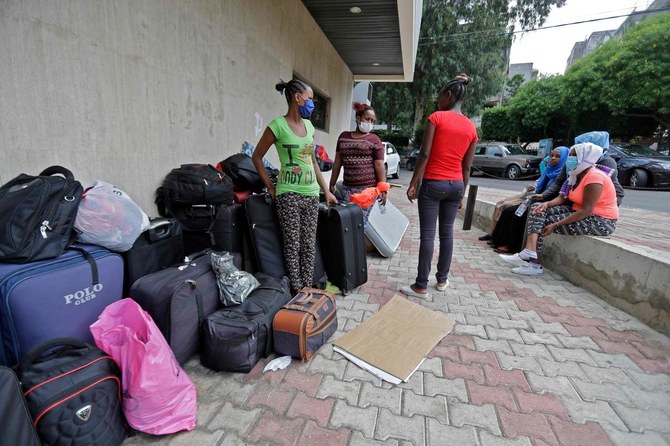
- Around 250,000 migrants — usually women — work as housekeepers, nannies and carers in Lebanese homes
- A large proportion of them are Ethiopian and some work for as little as $150 a month
Israeli forces repeatedly target Gaza aid workers, says Human Rights Watch

- They are among more than 250 aid workers who have been killed in Gaza since the war erupted more than seven months ago, according to UN figures
- Israel has killed more than 35,000 Palestinians in Gaza, mostly women and children, according to the health ministry in the Hamas-run territory
JERUSALEM: Human Rights Watch said on Tuesday that Israel had repeatedly targeted known aid worker locations in Gaza, even after their coordinates were provided to Israeli authorities to ensure their protection.
The rights watchdog said that it had identified eight cases where aid convoys and premises were targeted, killing at least 15 people, including two children.
They are among more than 250 aid workers who have been killed in Gaza since the war erupted more than seven months ago, according to UN figures.
In all eight cases, the organizations had provided the coordinates to Israeli authorities, HRW said.
This reveals “fundamental flaws with the so-called deconfliction system, meant to protect aid workers and allow them to safely deliver life-saving humanitarian assistance in Gaza,” it said.
“On one hand, Israel is blocking access to critical lifesaving humanitarian provisions and on the other, attacking convoys that are delivering some of the small amount that they are allowing in,” Belkis Wille, HRW’s associate crisis, conflict and arms director, said in Tuesday’s statement.
HRW highlighted the case of the World Central Kitchen, a US-based charity who saw seven of its aid workers killed by an Israeli strike on their convoy on April 1.
This was not an isolated “mistake,” HRW said, pointing to the other seven cases it had identified where GPS coordinates of aid convoys and premises had been sent to Israeli authorities, only to see them attacked by Israeli forces “without any warning.”
EU top diplomat sees US ‘fatigue’ in Mideast

- Josep Borrell strongly criticized Israel’s war campaign, saying Gazans were ‘dying and starving and suffering in unimaginable proportions’ and that it was a ‘man-made disaster’
- Josep Borrell: ‘I see a certain fatigue from the US side to continue engaging in looking for a solution’
On a visit to California, the bloc’s foreign policy chief Josep Borrell again strongly criticized Israel’s war campaign, saying Gazans were “dying and starving and suffering in unimaginable proportions” and that it was a “man-made disaster.”
“I see a certain fatigue from the US side to continue engaging in looking for a solution,” Borrell said in a speech Monday at Stanford University that was publicly released on Tuesday.
“We are trying to push with the Arab people in order to build together, the Arabs and Europeans, to make this two-state solution a reality,” he said in English.
US Secretary of State Antony Blinken has made seven trips to the Middle East since the unprecedented October 7 attack on Israel by Hamas which prompted a relentless Israeli military campaign in Hamas-ruled Gaza.
He has nudged Israel to allow in more aid, pushed against a regional escalation and pleaded for Israel to accept a two-state solution as part of a broader eventual deal that includes normalization with Saudi Arabia.
But the United States vetoed a Security Council bid to give Palestine full UN membership, arguing that statehood can only come though negotiations that address Israel’s security concerns.
The General Assembly last week passed a symbolic vote for Palestinian membership with the United States one of only nine countries to vote against.
The others opposed included two European Union members — the Czech Republic and Hungary. Among EU heavyweights, France voted in favor and Germany abstained.
Borrell acknowledged that the vote showed the European Union was “very much divided” over Gaza, unlike on the Ukraine war, and cited “historical reasons.”
“But it doesn’t mean that we don’t have to take a stronger part of responsibility because we have delegated (to) the US looking for a solution,” he said.
Borrell, a former Spanish foreign minister, in February sharply criticized the US arms flow for Israel, pointing to President Joe Biden’s own words that too many people were dying in Gaza.
Biden last week for the first time threatened to cut military aid to Israel, with one shipment of bombs already halted, if Israel defies US warnings and assaults the packed city of Rafah.
‘Nothing wrong’ with Gaza death toll figures

- Israel has killed more than 35,000 Palestinians, according to Gaza’s Health Ministry
GAZA STRIP: The World Health Organization voiced full confidence in Gaza Ministry of Health death toll figures on Tuesday, saying they were actually getting closer to confirming the scale of losses after Israel questioned a change in the numbers.
Gaza’s Health Ministry last week updated its breakdown of the total fatalities of around 35,000 since Oct. 7, saying that about 25,000 of those have so far been fully identified, of whom more than half were women and children.
This sparked allegations from Israel of inaccuracy since Palestinian authorities had previously estimated that more than 70 percent of those killed were women and children.
UN agencies have republished the Palestinian figures, which have since risen above 35,000 dead, citing the source.
“Nothing wrong with the data, the overall data (more than 35,000) are still the same,” said WHO spokesperson Christian Lindmeier at a Geneva press briefing. “The fact we now have 25,000 identified people is a step forward,” he added.
Based on his own extrapolation of the latest Palestinian data, he said that around 60 percent of victims were women and children, but many bodies buried beneath rubble were likely to fall into these categories when they were eventually identified.
He added that it was “normal” for death tolls to shift in conflicts.
“We’re basically talking about 35,000 people who are dead, and really every life matters, doesn’t it?” Liz Throssel, spokesperson for the UN human rights office, said at the same briefing. “And we know that many and many of those are women and children and there are thousands missing under the rubble.”
Lebanon state media says Israel strike kills two

- The enemy drone strike that targeted a car on the Tyre-Al-Hush main road martyred two people
BEIRUT: Lebanon’s state-run news agency said an Israeli drone strike on a car in the country’s south killed two people on Tuesday evening.
Israel and Hamas ally Hezbollah have exchanged near-daily fire following the Palestinian group’s October 7 attack on southern Israel that sparked war in Gaza.
“The enemy drone strike that targeted a car on the Tyre-Al-Hush main road martyred two people,” the National News Agency said, also reporting that ambulances had headed toward the site of the strike.
At least 413 people have been killed in Lebanon in seven months of cross-border violence, mostly militants but also including 79 civilians, according to an AFP tally.
Israel says 14 soldiers and 10 civilians have been killed on its side of the border.
Tens of thousands of people have been displaced on both sides.
Hostages’ plight casts pall over Israel’s Independence Day

- The more than seven-month war in Gaza and the absence of the remaining hostages have cast a long shadow over the normally joyous day
- “Like in Pesach (Jewish Passover), I didn’t feel it’s really a holiday of liberation,” Lavi Miran added
TEL AVIV: On Israel’s 76th Independence Day, victory feels far away for many agonizing over the fate of dozens of hostages still held in the war-ravaged Gaza Strip.
“On one side we’re still here, my daughters are still here, my family’s still here, and Israel is still here,” said Lishay Lavi Miran, from the Nir Oz kibbutz community, less than a kilometer (0.62 miles) from the Gaza border.
“But it’s not really independence because... Omri is over there,” added the 39-year-old, referring to her husband who was kidnapped and taken to the Palestinian territory on October 7 alongside about 250 other hostages.
He is among 128 captives who remain in Gaza, 36 of whom the army says are dead.
On May 14 every year, Israelis celebrate the anniversary of their state’s creation.
But the more than seven-month war in Gaza and the absence of the remaining hostages have cast a long shadow over the normally joyous day.
“Like in Pesach (Jewish Passover), I didn’t feel it’s really a holiday of liberation. I don’t feel now that there is really something to be happy about,” Lavi Miran added.
Batia Holin, from the neighboring kibbutz community of Kfar Aza, expressed similar feelings, saying “there is no independence here.”
Several Kfar Aza residents are still captive in Gaza.
Holin and other residents of the southern Israeli communities surrounding the border with Gaza have been evacuated since the October 7 Hamas attack.
“Even though I am in my country, I cannot be in my home and I will not be able to return for at least three years,” Holin, 71, said. “What kind of independence is this?“
And in northern Israel, where there have been a regular exchange of fire between Israeli forces and Lebanon’s Hezbollah, tens of thousands have been displaced.
“They can’t go home and have become refugees,” lamented Holin.
The unprecedented October attack saw militants surge through Gaza’s militarised border and resulted in the deaths of more than 1,170 people, mostly civilians, according to an AFP tally of official Israeli figures.
Israel responded with a relentless military campaign in the Hamas-run territory that has so far killed more than 35,100 people, according to the Gaza health ministry.
Israel is “a sovereign country where its citizens are refugees... It’s terrible,” Holin continued, recalling a brief return home to the community where more than 60 people were killed. She shut the door and left.
“That’s it. I don’t have a home anymore.”
Israel was founded in 1948 on the vow of a “Jewish national home” with the promise of safety to Jews, six million of whom were murdered during the Holocaust.
Based on this promise, many migrated to the newly formed state, including Lavi Miran’s grandparents who arrived from Libya and Azerbaijan.
For Palestinians, that period is known as the “Nakba,” or catastrophe, marked on May 15 every year to commemorate the mass displacement of around 760,000 Palestinians during the war that accompanied Israel’s creation.
During the Hamas attack, fighters ransacked Lavi Miran’s home “and took a lot of things. Even after seven months, I can’t touch stuff over there,” she said.
“They trashed all the house. They threw all of our clothes.”
But to her, the priority remains the return of the hostages. She has joined the regular protests by thousands calling on the Israeli government to reach a deal that would bring them back.
On Sunday, during a ceremony marking Memorial Day to commemorate fallen soldiers and civilian victims of attacks on Israel, army chief Herzi Halevi acknowledged he was “fully responsible” for the events of October 7.
“Hamas won the war, because they’re not here,” said Lavi Miran, referring to the hostages.
“Home, it’s just when he comes back,” she continued, referring to her husband Omri, a 47-year-old massage therapist.
“It’s like a nightmare. They’re in hell.”






